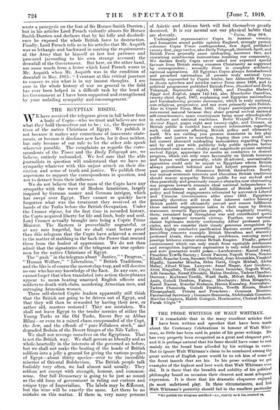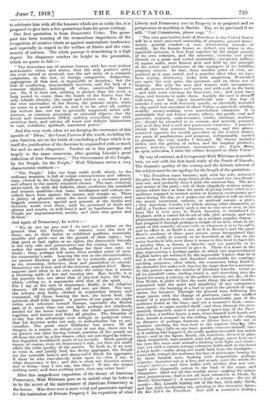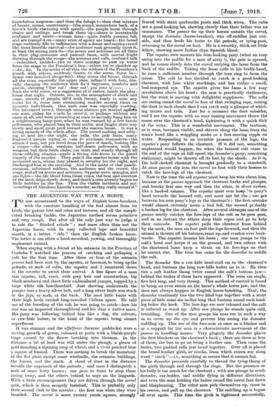THE PROSE WRITINGS OF WALT WHITMAN.
IT is remarkable that in the many excellent articles that have been written and speeches that have been made about the Centenary Celebrations in honour of Walt Whit- man, so little has been said in praise of his prose writings. He has very properly been recognized as a great and eloquent poet, and it is perhaps natural that his fame should have come to rest mainly on the broad base afforded by his writings in verse. But to ignore Walt Whitman's claim to be numbered among the great writers of English prose would be to rob him of some of the finest laurels that are his. In his prose writings we get examples of the highest and best work that Walt Whitman ever did. It is there that the breadth and nobility of his political philosophy found on occasion their clearest and most adequate expression. It is there that his dramatic eloquence enjoyed its most unfettered play. In these circumstances, and lost Walt Whitman's posterity should fail in the smallest particular
• We publish the telegram unedited-4e., exactly sa It has reached us.
to celebrate him with all the honours which are so richly his, it is proposed to give here a few quotations from his prose writings.
Our first quotation is from Democratic Vistas. The prose- poet has been treating of the tremendous importance of the recognition of creative ideals as against materialistic tendencies, and especially in regard to the welfare of States and .the com- munity of nations. The whole passage is stimulating in a high
degree. Its eloquence reaches its height in the peroration, which we quote in full :— The historians say of ancient Greece, with her ever jealous autonomies, cities, and states, that the only positive unity she ever owned or received, was the sad unity of a common subjection, at the last, to foreign conquerors. Subjection, aggregation of that sort, is impossible to America ; but the fear of conflicting, irreconcilable interiors, and the lack of a common skeleton, knitting all close, continually haunts me. Or, if it does not, nothing is plainer than the need, a long period to come, than the fusion of the States into the only reliable identity, the moral and artistic one. For, I say, the true nationality of the States, the genuine union, when we come to a moral crisis, is, and is to be, after all, neither the written law, nor (as is generally supposed) either self- interest, or common pecuniary or material objects—but the fervid and tremendous IDEA, melting everything else with resistless heat., and solving all lesser and definite distinctions in vast, indefinite, spiritual, emotional power."
And this very week, when we are keeping the centenary of this apostle of " Ideas," the Great Powers of the world, including his own America, are on the brink of concluding a Peace which is in itself the justification of the doctrine he expounded with so much fire and so much eloquence. Further on in this passage, and largely in the same connexion, after quoting Lincoln's great definition of true Democracy, "The Government of the People, by the People, for the People," Walt Whitman utters a very characteristic outburst :—
" The People ! Like our huge earth itself, which, to the ordinary scansion, is full of vulgar contradictions and offence, man, viewed in the lump, displeases, and is a constant puzzle and affront to the merely educated classes. The rare, cosmical; artist-mind, lit with the Infinite, alone confronts his manifold and oceanic qualities--but taste, intelligence and culture (so- called) have been against the masses and remain so. There is plenty of glamour about the most damnable crimes and hoggish meannesscs, special and general, of the feudal and dynastic world over there, with its personnel of lords and queens and courts, so well-dress'd and so handsome. But the People are ungrammatical, untidy, anil their sins gaunt and ill-bred."
And again of Democracy, he writes :—
" We do not (at any rate I do not) put it either on the ground that the People, the masses, oven the best of them, are, in their latent or exhibited qualities, essentially sensible and good—nor on the ground of their rights ; but that good or bad, rights or no rights, the democratic formula is the only safe and preservative one for coming times. We endow the masses with the suffrage for their own sake, no doubt ; then, perhaps still more, from another point of view, for community's sake. Leaving the rest to the sentimentalists, we present freedom as sufficient in its scientific aspect, cold as ice, reasoning, deductive, clear and passionless as crystal. Democracy too is law, and of the strictest, amplest kind. Many suppose (and often in its own ranks the error) that it means a throwing aside of law and running riot. But, briefly, it is the superior law, not alone that of physical force, the body, Which, adding to, it supersedes with that of the spirit. . For I say at the core of democracy, finally, is the religious element. All the religions, old and new, are there. Nor may the scheme atop forth, clothed in resplendent beauty and command, till these; bearing the best, the latest fruit, the spiritual, shall fully appear. A portion of our pages we might indite with reference toward Europe, especially the British part of it, more than our own land, perhaps not absolutely needed for the home reader. But the whole question hangs together, and fastens and links all peoples. The liberalist of to-day has this advantage over antique or mediaeval times, that his doctrine seeks not only to individualize but to uni- versalize. The great word Solidarity has arisen. Of all dangers to a nation, as things exist in our day, there can be no greater one than having certain portions of the people set off from the rest by a line drawn—they not privileged as others, but degraded, humiliated, made of no account. Much quackery teems, of course, even on democracy's side, yet does not really affect the orbic quality of the matter. To work in, if we may so term it, and justify God, his divine aggregate, the People (or the veritable horrid and sharp-tail'd Devil, his aggregate, if there be who convulsively insist upon it)—this, I say, is what democracy is for ; and this is what our America means and is doing—may I not say, has done ? If not, she means nothing more, and does nothing more, than any other land."
After this magnificent exposition of the theory of American Democracy, Walt Whitman goes on to unfold what he believal to be the secret of the maintenance of American Democracy in the future. Was there ever a more vivid and passionate apology for the institution of Private Property ? Its exposition of what. Liberty and Democracy owe to Property is as poignant and 8-9 perspicuous as anything in Baatiat. May we be pardoned if we add, " Coal Commission, please copy " ?- " The true gravitation-hold of liberalism in the Visited States will be a more universal ownership of property, general home. steads, general comfort—a vast, intertwining reticule—of wealth. As the human frame, or, indeed, any object in this manifold universe, is best kept together by the simple miracle of its own cohesion, and the necessity, exercise and profit thereof, eo a great and varied nationality, occupying millions of square miles, were firmest knit and held by the principle of the safety and endurance of the aggregate of its middling property owners. So that, from another point of view, un- gracious as it may sound, and a paradox after what, we have been saying, democracy looks with auspicious, ill-satisfied eye upon the very poor, the ignorant, and on those out of business. She asks for men and women with occupations. welhoff, mailers of houses and acres, and wills cash in the bank —and with some cravings for literature, too : and must have them, and hastens to make them. Luckily the seed is alrewh well-sown, and has taken ineradicable root. For fear of mistake I may as well distinctly specify, se cheerfully included in the model and standard of these Vistas, a practical, stirring. worldly, moneymaking. even materialistic character. It is undeniable that our farms, stores, offices, dry-goods, coal and groceries, enginery, cash-accounts, trades, earnings, markets, etc., should be attended to in earnest, and actively pursued. just as if they had a real and permanent existence. I perceive clearly that that extreme business energy, and this almost maniacal appetite for wealth provident in the United States. are parts of amelioration and progress, indispensably needed
to prepare the very results I demand. My theory includes riches, and the getting of riches, and the amplest product5, power, activity, inventions, movements, etc. Upon them. as upon substrata, I raise the edifice designed in these Vistas."
By way of contrast, sod to represent Walt Whitman in another vein, we end with his first-hand study of the Death of Lincoln. The dramatic quality of the writing and the historic interest of the subject must be our apology for the length of the quotation:- " The President came betimee, and, with hie wife, witness'il the play from the large stage-boxes of the second tier, two thrown into one. and profusely thap'd with the national flag. The acts and scenes of the piece—one of those singularly written compo- sitions which have at least the merit of giving entire relief to an audience engaged in mental action or business excitements and cares during the day, as it makes not the slightest call on either the moral, emotional, esthetic, or spiritual nature—a piece, (' Our American Cousin,') in which, among other characters, as mind, a Yankee, certainly such a one as was never seen, or the least like it ever seen, in North America, is introduced in England, with a varied fol.de.rol of talk, plot, scenery, and such phantasmagoria as goes to make up a modem popular drama— had progress'd through perhaps a couple of its acts, when in the midst of this comedy, or non-such, or whatever it. is to be call'il, and to offset it, or finish it out, as if in Nature's and the great Muse's mockery of those poor mimes, came interpolated that scene, not really or exactly to be described at all, (for on thus many hundreds who were there it seems to this hour to have left a passing blur, a dream, a blotch)—and yet partially to be described as I now proceed to give it. There is a scene in the play representing a modem parlor, in which two unprecedented English ladies are inform'd by the impossible Yankee that lie is not a man of fortune, and therefore undesirable for marriage catching purposes ; after which, the comments being finish'd, the dramat lc trio make exit, leaving the stage clear for a moment. At this period came the murder of Abraham Lincoln. Great an all its manifold train, circling round it, and stretching into the future for many a century, in the politics, history, art, &c., of the New World, in point of fact the main thing, the actual murder, transpired with the quiet and simplicity of any commonest occurrence—the bursting of a bud or pod in the growth of vege- tation, for instance. Through the general hum following the stage pause, with the change of positions, came the muffled sound of a pistol-shot, which not one-hundredth part of the audience heard at the time—and yet a moment's hush—some- how, surely, a vague startled thrill—and then, through the orna- mented, draperied, stared and striped space-way of the Presi- dent's box, a sudden figure, a man, raises himself with hands and feet, stands a moment on the railing, leaps below to the stage, (a distance of perhaps fourteen or fifteen feet,) falls out of position, catching his boot-heel in the copious draptcy, (the American flag.) falls on one knee, quickly recovers himself, rises as if nothing had happen'd, (he really sprains his ankle but unfelt then)—and so the figure, Booth, the murderer, drees'd in plain black broadcloth, bare-headed, with full, glossy, raven heir, and his eyes like some mad animal's flashing with light and resolu- tion, yet with a certain strange calmness, holds aloft in one hand a large knife—walks along not much back from the footlights-- turns fully toward the audience his face of statuesque beauty, lit by those basilisk eyes, flashing with desperation, perhaps insanity—launches out in a firm and steady voice the words Sic winner tyranois—and then walks with neither slow nor very rapid pace diagonally across to the hack of the stage, and disappears. (Had not all this terrible scene—making the mimic ones preposterous—had it not 811 been rehears'd, in blank, by Booth, beforehand ?) A moment's hush—a scream—the cry of murder—Mrs. Lincoln leaning out of the box, with ashy cheek. and lips, with involuntary cry,-pointing to the retreating figure, He has had the President. And still a moment's strange, incredulous suspense—and then the deluge l—then that mixture of horror, noises, uncertainty—(the sound, somewhere back, of a horse's hoofs clattering with speed)—the people burst through chairs and railings, and break them up.--there is. inextricable confusion and terror—women faint—qurte feeble persons fall, and are trasopl'd on—many arise-of agony, are heard:—the.hroad stage suddenly fills to suffocation with a dense andenotley crowd like some horrible carnival—the audience rush generally upon it, at least the strong men do—the actors and actresses are all there in their play-costumes and painted faces, with mortal fright: showing through the,rouge—#,he sereemmand calls, confused talk —redoubled, trebled—two or three manage to pass up water, from the stage to the President's box—others try to clamber up.
ara. Inthe midst of all this, the soldiers of the President's guard, with others, suddenly drawn to the scene, burst in— (some two hundred altogether)—they storm the house, through all the tiers, especially the upper ones, inflam'd with fury, lite- rally charging the audience with fix'd bayonets, muskets and pistols, shouting Clear oat! dear ou tI you sons of
Such the wild scene, or-a suggestion of it rather, inside the play- house that night. Outside, too, in.the-.atmosphere of shock and erase, crowds of peoples fill'd with frenzy, ready- to. seize any outlet for it, come near committing murder several times on innocent individuals, One such ease was- especially exciting. The infuriated crowd, through some chance, got started agiffillit one man, either for words he utter'd, or perhaps without any cause at all, and were proceeding at once to actually hang him on is neighbouring lamp-post, when he was rescued by a few heroic policemen, who placed him in their midst, and fought their way slowly and-amid-great peril toward the station house. It was a fitting episode of the whole affair. The crowd rushing and eddy- ing to and fro—the night, the yells,, the pale faces, many frighten'd people trying in vain to extricate themeelves—the attack'd man, not yet freed from the jaws of death, looking like a corpse—the silent, resolute, half-dozen policemen, with no weapons. but their little clubs, yet stern and. steady through all those eddying swarms—made a fitting side-scene to the grand tragedy of the murder. They gain'd the station house with the protected. nun, whom they- placed in security for the night, and discharged him in the morning. And in the midst of that pande- monium, infuriated soldiers, the. audience and the crowd, the stage, and all its emote and actresses, itspaint-pots, spangles, and gas-lights—the life blood from those veins the beat and sweetest of the land, drips slowly. down, and death'seeze already-begins ite little- bubbles on the lips. Thuethe visible incidents. and sur- roundings of Abraham Lincoln's murder, as-they really.occurecl."




































 Previous page
Previous page